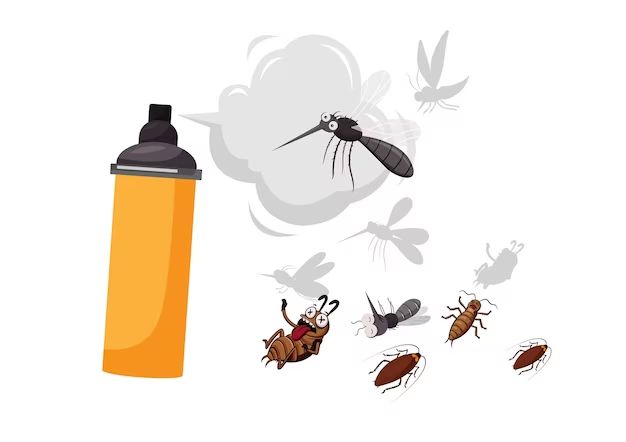Page Contents
What Is Mouthwash?
Mouthwash is an oral antiseptic liquid used for preventing and treating oral diseases. The active ingredients in mouthwashes include cetylpyridinium chloride, chlorhexidine, hydrogen peroxide, chlorine dioxide, essential oils, and fluoride. Mouthwash helps kill bacteria in the mouth, freshen breath, and prevent plaque buildup. Some brands contain alcohol while others are alcohol-free. Using mouthwash daily after brushing and flossing can help improve oral hygiene.
What Are Mosquito Repellents?
Mosquito repellents are substances applied to skin, clothing, or other surfaces that discourage mosquitoes from landing or climbing on that surface. There are various types of repellents including DEET, picaridin, IR3535, oil of lemon eucalyptus, para-menthane-diol, and 2-undecanone. These repellents work by blocking mosquitoes’ ability to detect carbon dioxide and lactic acid emitted from the human body. This causes the mosquitoes to be confused and unable to land on the skin to bite. An effective mosquito repellent can protect against diseases spread by mosquitoes like malaria, dengue, Zika, and West Nile virus.
Can You Use Mouthwash as a Mosquito Repellent?
Using mouthwash as a mosquito repellent is generally not recommended for the following reasons:
Mouthwashes are not designed as insect repellents
Mouthwashes are formulated to be used in the oral cavity for dental hygiene purposes. They are not designed for use on the skin or as an insect repellent. The ingredients and concentrations used in mouthwashes are meant for reducing bacteria in the mouth, not repelling mosquitoes.
Lack of proven effectiveness
There is no scientific research or evidence that confirms the ability of mouthwashes to effectively repel mosquitoes. Specific ingredients like DEET and oil of lemon eucalyptus have been extensively studied and proven to deter mosquitoes. But common mouthwash ingredients like cetylpyridinium chloride, essential oils, menthol, thymol, eucalyptol, and alcohol have not been shown to repel mosquitoes when applied topically.
Potential skin irritation
Many mouthwashes contain alcohol and other antimicrobial agents that can cause skin irritation, dryness, redness or peeling when applied directly. The menthol in some mouthwashes may also cause a cooling sensation that could be uncomfortable on the skin. Mouthwashes are not designed for leave-on topical use.
Lack of protection time
Effective mosquito repellents provide protection lasting hours. DEET repellents can protect for 3-6 hours typically. But there is no data on how long mouthwashes could repel mosquitoes when applied on the skin. It’s unlikely the effects would last as long as dedicated repellents. Reapplication would be needed more frequently.
Possible ingestion
Using mouthwash on the skin means it could accidentally get ingested if applied on hands or near the mouth and lips. Many mouthwashes contain alcohol and other ingredients meant to be briefly rinsed rather than swallowed. Ingesting mouthwash could potentially lead to nausea, vomiting, and toxicity if large amounts are consumed.
Other effective options available
Rather than use an unproven repellent like mouthwash, it’s better to use an EPA-registered product containing ingredients like DEET, picaridin, or oil of lemon eucalyptus which have been tested specifically for deterring mosquitoes. These approved repellents are designed for safe and long-lasting protection against mosquito bites when used as directed.
Can Any Mouthwash Ingredients Repel Mosquitoes?
A few particular mouthwash ingredients have been associated with some mosquito repelling properties when used at higher concentrations not typically found in mouthwashes:
Essential oils
Some essential oils like citronella, lemon eucalyptus, peppermint, and rosemary have demonstrated mosquito repelling effects in studies. However, most mouthwashes contain essential oils primarily for flavoring at very low concentrations around 0.06% or less. At such low levels, the essential oils in mouthwash are unlikely to provide meaningful protection against mosquitoes.
Eucalyptol
Eucalyptol is a compound found in eucalyptus oil. In a 2011 study, researchers found that applying 32% eucalyptol provided over 90% protection from mosquitoes for 2 hours. Most mouthwashes have trace amounts of eucalyptol, generally less than 0.15%, far below an effective concentration.
Thymol
Thymol is another plant-derived compound that has exhibited mosquito repellency. However, typical mouthwash thymol levels around 0.064% are likely too low to have any significant mosquito repelling effects.
Can You Make Your Own Mouthwash Mosquito Repellent?
Trying to make homemade mosquito repellent from mouthwash ingredients is not advisable. Developing an effective, properly concentrated formula requires significant research and testing. Without precise ingredient formulations and extensive safety testing, homemade repellents using mouthwash components could cause skin irritation and other harm if applied directly to the body. It’s best to stick with trusted, commercially available repellents that have been registered with the EPA and tested for efficacy and human health.
Conclusion
In summary, while some mouthwash ingredients like essential oils, eucalyptol, and thymol have displayed mosquito repelling properties, typical mouthwashes contain these components at levels far too low to effectively deter mosquitoes. Mouthwash is meant for oral use and has not been scientifically proven to repel mosquitoes when applied to skin. Dedicated mosquito repellents like those containing DEET or picaridin remain the best options for protecting against mosquito bites and insect-borne illnesses. So while it may seem like an easy shortcut, for optimal safety and mosquito protection, it’s better to avoid using common mouthwash as a DIY bug spray. Consult your doctor for personalized recommendations on effective mosquito repellents for you and your family.
